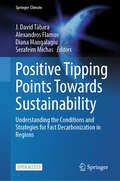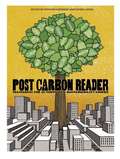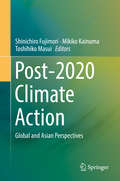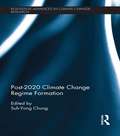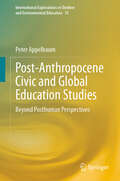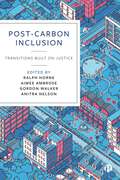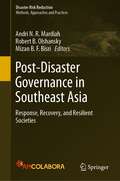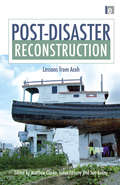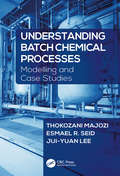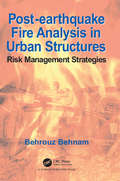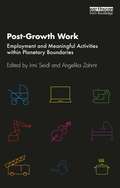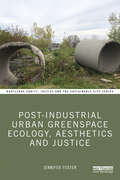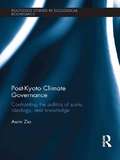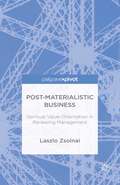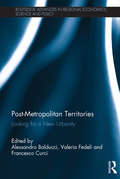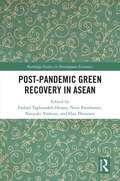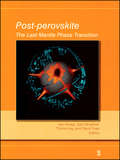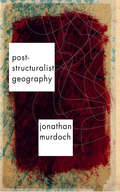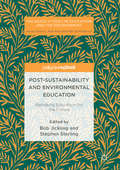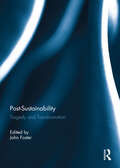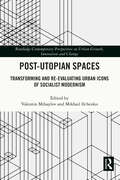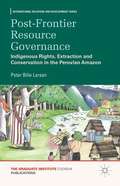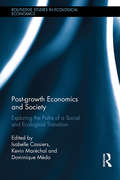- Table View
- List View
Positive Tipping Points Towards Sustainability: Understanding the Conditions and Strategies for Fast Decarbonization in Regions (Springer Climate)
by J. David Tàbara Alexandros Flamos Diana Mangalagiu Serafeim MichasThis open access book provides the first comprehensive review of the state of the art of social tipping points applied to energy systems from a social interdisciplinary perspective. It does so by presenting a novel theory of systemic and transformative change, linking it to empirical cases assisted with relevant assessment methodologies, including modeling. The authors unveil the narratives and visions, the transformative capacities as well as deliberate strategies and collective actions that at one point in time have been able - or were prevented - to tip a given social-ecological system towards low-carbon, sustainable trajectories in diverse high-intensive carbon regions around the world. This volume shows that self-reinforcing learning feedbacks connecting transformative solutions and strategies across scales and domains can be induced by targeted policy interventions both in local and regional contexts. It further indicates how changes in behavioral patterns, supported by good governance of disruptive technologies, carbon (dis)investment and finance processes as well as new forms of civic engagement, can create the necessary transformative enabling conditions for the emergence of positive tipping points towards low-carbon sustainable futures. The book is a must-read for students, researchers, and scholars, as well as policy-makers and practitioners interested in a better understanding of sustainability, climate, and energy issues and in assessing the potential impacts and effectiveness of strategic interventions aimed at accelerating just sustainable decarbonization processes.
Post Carbon Reader: Managing the 21st Century's Sustainability Crises
by Richard Heinberg Daniel LerchHow do population, water, energy, food, and climate issues impact one another? What can we do to address one problem without making the others worse? The Post Carbon Reader features essays by some of the world's most provocative thinkers on the key issues shaping our new century, from renewable energy and urban agriculture to social justice and community resilience. This insightful collection takes a hard-nosed look at the interconnected threats of our global sustainability quandary and presents some of the most promising responses. Book jacket.
Post-2020 Climate Action
by Shinichiro Fujimori Mikiko Kainuma Toshihiko MasuiThis book summarizes assessments of the Paris Agreement to provide an excellent introduction to this research field. The AIM/CGE (Asia-Pacific Integrated Modeling /Computable General Equilibrium) model, which is the core of AIM modeling framework, is used for the assessment. The first part focuses on global issues, presenting both short-term (a few decades) and long-term (century scale) assessments in the context of the Agreement's ultimate climate goal. It also discusses policy implementation and climate risk. Part 2 is a collection of assessments of individual Asian countries, providing insights into the national situations and detailed analyses. It includes contributions from Asian countries as well as NIES (National Institute for Environmental Studies, Japan) members. The main conclusion is that many countries require changes to their energy systems change and societal transformation in order to meet emissions targets. Part 3 describes in detail the AIM/CGE model, which is used to evaluate the climate and energy policies by simulating the future economic and energy and environmental situation in the Asia-Pacific region. This section can be used as a standard text on CGE modelling in climate change mitigation.
Post-2020 Climate Change Regime Formation (Routledge Advances in Climate Change Research)
by Suh-Yong ChungThe fate of the climate change regime hangs in the balance as the UN-led negotiations try to forge a new international strategy for the post-2020 period. Since 1992, the UNFCCC and its Kyoto Protocol has been the primary legal instrument to respond to the climate challenge. However, the intergovernmental process has been riddled with problems that have rendered it ineffective. The changing economic landscape has further made this country grouping problematic as some developing countries now emit more than some of their advanced counterparts. Such problems have crippled the existing regime in adequately addressing climate change. Building upon the expertise of the contributors of this volume, this ground-breaking collection aims to show the way forward for the intergovernmental process. It is the first of its kind to explore the key features of the regime, featuring meticulously researched pieces from leading experts in the field. Each chapter responds to the questions surrounding the political and structural limitations of the current top-down approach taken in climate negotiations and proposes various alternatives countries can take to overcome such limitations in the process of building the post-2020 climate change regime. In particular, this collection underscores the concept of low-carbon development and green growth to make the climate change regime more effective.
Post-Anthropocene Civic and Global Education Studies: Beyond Posthuman Perspectives (International Explorations in Outdoor and Environmental Education #15)
by Peter AppelbaumThis book explores community action within our more-than-human lifeworld, tackling post-Anthropocene challenges. It presents bold experiments, shifting from crisis study to asking, "How are we here?". It addresses key issues by moving beyond posthuman perspectives, integrating indigenous ways of being, resisting ‘Doomer Culture’, and rejecting blind ‘Hopeism’. Part 1 focuses on Post-Anthropocene Pedagogies from an Education Studies perspective. Part 2 illustrates the power of these pedagogies, while Part 3 delves into literature on Post-Anthropocene Education. Part 4 illustrates the approach via case studies of teaching, the development of an NGO, and community art projects. The narrative emphasizes maintaining a two-way flow between human culture and nature, highlighting porous boundaries. It argues that mere knowledge won't cure or save the world. Instead, it advocates for leadership and civic engagement that enrich reconnection with place and stewardship. The primary audience is within environmental education, sustainability studies, curriculum studies, post-human studies, sociology of education, and resource management as educational enterprise.
Post-Carbon Inclusion: Transitions Built on Justice
by Ralph Horne, Aimee Ambrose, Gordon Walker and Anitra NelsonThis collection pays unique attention to the highly challenging problems of addressing inequality within decarbonisation – particularly under-explored aspects, such as high consumption, degrowth approaches and perverse outcomes. Contributors point out means and possibilities of the transition from high carbon inequalities to post-carbon inclusion. They apply a variety of conceptual and methodological approaches in all-inclusive ways to diverse challenges, such as urban heating and retrofitting. Richly illustrated with case studies from the city to the household, this book critically examines ‘just transitions’ to achieve sustainable societies in the future.
Post-Disaster Governance in Southeast Asia: Response, Recovery, and Resilient Societies (Disaster Risk Reduction)
by Robert B. Olshansky Mizan B. F. Bisri Andri N. R. MardiahThis book aims to provide insight into how Southeast Asian countries have responded to disasters, recovered, and rebuilt. It investigates emergency response and disaster recovery cases at national levels and from regional perspectives. Recovery from great disasters poses great challenges to affected countries in terms of organization, financing, and opportunities for post-disaster betterment. Importantly, disasters are critical moments in which to achieve disaster risk reduction, especially in the context of climate change and Sustainable Development Goals. Insights from these cases can help other countries better prepare for response and recovery before the next disaster strikes. While the experiences of disaster risk reduction and climate change implementation in Southeast Asian countries have been well documented, tacit knowledge from emergency response and recovery from these countries has not been transformed into explicit knowledge. There are only a few books that integrate information and lessons from post-disaster governance in Southeast Asia as a region, and because of the importance of providing real and recent situations, this book will interest many policymakers, practitioners, and academics. The information presented here will lead to a better understanding of how to plan for future disasters and improve governance to ensure effective emergency response as well as encouraging a build back better and safer towards a more resilient and sustained recovery.
Post-Disaster Reconstruction: Lessons from Aceh
by Matthew Clarke Sue Kenny Ismet FananyOn Sunday 26 December 2004, a tsunami of up to 30 metres high hit the northern tip of Sumatera in Indonesia, causing immediate destruction and the deaths of at least 130,000 in Indonesia alone. The scale of the devastation and ensuing human suffering prompted the biggest response endeavour to any natural disaster in history. Post-Disaster Reconstruction will be the first major book that analyses the different perspectives and experiences of the enormous post-tsunami reconstruction effort. It looks specifically at the reconstruction efforts in Aceh, one of the regions most heavily-hit by the tsunami and a province that has until recently suffered nearly three decades of armed conflict. Positioning the reconstruction efforts within Aceh's multi-layered historical, cultural, socio-political and religious contexts, the authors explore diverse experiences and assessments of the reconstruction. It considers the importance of the political and religious settings of the reconstruction, the roles of communities and local non-government organisations and the challenges faced by Indonesian and international agencies. From the in-depth examination of this important case study of disaster reconstruction - significant not only because of the huge scale of the natural disaster and response but also the post-conflict issues - the editors draw together the lessons learned for the future of Aceh and make general recommendations for post-disaster and post-conflict reconstruction-making.
Post-Earthquake Fire Analysis in Urban Structures: Risk Management Strategies
by Behrouz BehnamPost-earthquake fire is one of the most complicated problems resulting from earthquakes and presents a serious risk to urban structures. Most standards and codes ignore the possibility of post-earthquake fire; thus it is not factored in when determining the ability of buildings to withstand load. This book describes the effects of post-earthquake fire on partially damaged buildings located in seismic urban regions. The book quantifies the level of associated post-earthquake fire effects, and discusses methods for mitigating the risk at both the macro scale and micro scale. The macro scale strategies address urban regions while the micro scale strategies address building structures, covering both existing buildings and those that are yet to be designed.
Post-Earthquake Fire Analysis in Urban Structures: Risk Management Strategies
by Behrouz BehnamPost-earthquake fire is one of the most complicated problems resulting from earthquakes and presents a serious risk to urban structures. Most standards and codes ignore the possibility of post-earthquake fire; thus it is not factored in when determining the ability of buildings to withstand load. This book describes the effects of post-earthquake fire on partially damaged buildings located in seismic urban regions. The book quantifies the level of associated post-earthquake fire effects, and discusses methods for mitigating the risk at both the macro scale and micro scale. The macro scale strategies address urban regions while the micro scale strategies address building structures, covering both existing buildings and those that are yet to be designed.
Post-Growth Work: Employment and Meaningful Activities within Planetary Boundaries
by Irmi Seidl Angelika ZahrntThis book argues that society must rethink the notion of formal employment and instead introduce and spread the notion of "meaningful work" so that societies can become independent of economic growth. The excessive consumption of natural resources and the immense emissions resulting from our growth-oriented economic system surpass the planetary boundaries. Despite this, society and the economy still strive for economic growth in order to generate jobs, to finance the social security system and to assure tax income. However, these expectations are increasingly unrealistic, not least because technological developments such as digitalisation and robotisation will change and limit formal employment opportunities as well. Against this backdrop, the book introduces the notion of meaningful activities that embrace various kinds of work, paid and unpaid, sequential or in parallel, which are meaningful for the worker as well as society as a whole. At the same time, the authors argue in favour of reduced working time in formal employment. Furthermore, the book also describes the necessary transformations in companies and for consumers, for social and tax systems, for social services and agriculture. Innovative and timely, this book will be a key resource for professionals and scholars interested in sustainability, economics, work, transformation and post-growth studies.
Post-Industrial Urban Greenspace Ecology, Aesthetics and Justice (Routledge Equity, Justice and the Sustainable City series)
by Jennifer FosterThis book offers original theoretical and empirical insight into the social, cultural and ecological politics of rapidly changing urban spaces such as old factories, rail yards, verges, dumps and quarries. These environments are often disregarded once their industrial functions wane, a trend that cities are experiencing through the advance of late capitalism. From a sustainability perspective, there are important lessons to learn about the potential prospects and perils of these disused sites. The combination of shelter, standing water and infrequent human visitation renders such spaces ecologically vibrant, despite residual toxicity and other environmentally undesirable conditions. They are also spaces of social refuge. Three case studies in Milwaukee, Paris and Toronto anchor the book, each of which offers unique analytical insight into the forms, functions and experiences of post-industrial urban greenspaces. Through this research, this book challenges the dominant instinct in Western urban planning to "rediscover" and redevelop these spaces for economic growth rather than ecological resilience and social justice. This book will be of great interest to students and researchers of Urban Planning, Ecological Design, Landscape Architecture, Urban Geography, Environmental Planning, Restoration Ecology, and Aesthetics.
Post-Kyoto Climate Governance: Confronting the Politics of Scale, Ideology and Knowledge (Routledge Studies in Ecological Economics #27)
by Asim ZiaIn the midst of human-induced global climate change, powerful industrialized nations and rapidly industrializing nations are still heavily dependent on fossil fuels. Even if we arrive at a Hubbert’s peak for oil extraction in the 21st century, the availability of technologically recoverable coal and natural gas will mean that fossil fuels continue to be burned for many years to come, and our civilization will have to deal with the consequences far into the future. Climate change will not discriminate between rich and poor nations, and yet the UN-driven process of negotiating a global climate governance regime has hit serious roadblocks. This book takes a trans-disciplinary perspective to identify the causes of failure in developing an international climate policy regime and lays out a roadmap for developing a post-Kyoto (post-2012) climate governance regime in the light of lessons learned from the Kyoto phase. Three critical policy analytical lenses are used to evaluate the inherent complexity of designing post-Kyoto climate policy: the politics of scale; the politics of ideology; and the politics of knowledge. The politics of scale lens focuses on the theme of temporal and spatial discounting observed in human societies and how it impacts the allocation of environmental commons and natural resources across space and time. The politics of ideology lens focuses on the themes of risk and uncertainty perception in complex, pluralistic human societies. The politics of knowledge lens focuses on the themes of knowledge and power dynamics in terms of governance and policy designs, such as marketization of climate governance observed in the Kyoto institutional regime.
Post-Kyoto International Climate Policy: Implementing Architectures for Agreement
by Joseph E. Aldy Robert N. StavinsThe Harvard Project on International Climate Agreements is a global, multi-disciplinary effort intended to help identify the key design elements of a scientifically sound, economically rational, and politically pragmatic post-2012 international policy architecture for addressing the threat of climate change. It has commissioned leading scholars to examine a uniquely wide range of core issues that must be addressed if the world is to reach an effective agreement on a successor regime to the Kyoto Protocol. The purpose of the project is not to become an advocate for any single policy but to present the best possible information and analysis on the full range of options concerning mitigation, adaptation, technology, and finance. The detailed findings of the Harvard Project are reported in this volume, which contains twenty-seven specially commissioned chapters. A companion volume summarizing the main findings of this research is published separately as Post-Kyoto International Climate Policy: Summary for Policymakers.
Post-Materialist Business: Spiritual Value-Orientation in Renewing Management
by László ZsolnaiPost-Materialist Business presents a spiritual-based approach to business and management. It uses pluralistic view of spirituality and provides a number of inspiring cases of alternative organizations which go beyond the materialistic mindset of business and serve the common good of society, nature, and future generations.
Post-Metropolitan Territories: Looking for a New Urbanity (Routledge Advances in Regional Economics, Science and Policy)
by Alessandro Balducci Valeria Fedeli Francesco CurciProcesses of multi-scalar regional urbanization are occurring worldwide. Such processes are clearly distinguishable from those of the nineteenth and twentieth centuries due to the shifting concepts of both the city and the metropolis. International literature highlights how what we have historically associated with the idea of cities has long been subjected to consistent reconfiguration, which involves stressing some of the typical features of the idea of "cityness". Post-Metropolitan Territories: Looking for a New Urbanity is the product of a research project funded by the Italian Ministry for Education, Universities and Research (MIUR). It constitutes a thorough overview of a country that is one of Europe's most diverse in terms of regional development and performance: Italy. This book brings together case studies of a number of Italian cities and their hinterlands and looks at new forms of urbanization, exploring themes of sustainability, industrialization, de-industrialization, governance, city planning and quality of life. This volume will be of great interest to academics and students who study regional development, economic geography and urban studies, as well as civil servants and policymakers in the field of spatial planning, urban policy, territorial policies and governance.
Post-Pandemic Green Recovery in ASEAN (Routledge Studies in Development Economics)
by Naoyuki Yoshino Farhad Taghizadeh-Hesary Nisit Panthamit Han PhouminASEAN’s real gross domestic product (GDP) had declined sharply due to the COVID-19 pandemic. The economic downturn and the uncertainty about the future reduced the new investments in green projects drastically. Besides this, many governments rolled back environmental regulations and taxes and increased fossil-fuel intensive infrastructure and electricity to stimulate economic growth. Post-Pandemic Green Recovery in ASEAN consists of several empirical studies using fresh data, with regional and country-level perspectives on ways to keep the greenness of the economic recovery plans. The chapters look at various aspects and sectors, including tourism, infrastructure, energy, small and medium enterprises (SMEs), employment, and livelihood, by assessing the effectiveness of various tools and instruments, including green finance, carbon taxation, green Sukuk, credit guarantee, cash transfer payment, power purchase agreements, and the related policies. They also provide practical policy recommendations useful for the ASEAN member states and other developing regions for the green recovery in the post-pandemic. Reiterating the importance of green and low-carbon mechanisms and climate change tackling policies besides the usual economic recovery strategies, this book is a precious resource for the researchers of economics, finance, ASEAN and Asian studies, and policymakers.
Post-Perovskite: The Last Mantle Phase Transition
by Kei Hirose John Brodholt Thorne Lay David YuenPublished by the American Geophysical Union as part of the Geophysical Monograph Series, Volume 174.<P><P> Discovery of the perovskite to post-perovskite phase transition in MgSiO3, expected to occur for deep mantle conditions, was first announced in April 2004. This immediately stimulated numerous studies in experimental and theoretical mineral physics, seismology, and geodynamics evaluating the implications of a major lower mantle phase change. A resulting revolution in our understanding of the D" region in the lowermost mantle is well underway. This monograph presents the multidisciplinary advances to date ensuing from interpreting deep mantle seismological structures and dynamical processes in the context of the experimentally and theoretically determined properties of the post-perovskite phase change; the last silicate phase change likely to occur with increasing pressure in lowermost mantle rocks.
Post-Petroleum Design
by George ElvinDespite the growing demand for design strategies to reduce our petroleum use, no one has yet brought together the lessons of the world’s leading post-petroleum designers into a single resource. Post-Petroleum Design brings them together for the first time. Readers will be introduced to the most current, innovative, plastic-and petroleum-free products and projects in industrial design, architecture, transportation, electronics, apparel and more. Post-Petroleum Design explores firsthand the client and consumer motivations behind the demand, and shares the case studies, principles, best practices, risks and opportunities of the world’s leading post-petroleum design experts who are already meeting that demand. It introduces 40 inspiring individuals from across the globe; people like Eben Bayer, the American innovator whose company, Ecovative, is growing houses from mushrooms; Mohammed Bah Abba, whose Zeer Pot is helping families keep produce fresh in the sweltering Nigerian summer without electricity; and the engineers at Mercedes-Benz Advanced Design Studios whose Biome car evolves from genetically engineered DNA. Post-Petroleum Design gives design professionals the information they need to research, evaluate, and select materials, technologies and design strategies that meet the growing demand for sustainable design, plastic-free materials and process energy conservation. Designer profiles, studies, statistics and many colour illustrations all highlight the work—some of the best design work to be found anywhere, and showcased here for the first time.
Post-Structuralist Geography: A Guide to Relational Space
by Jonathan Murdoch'Murdoch has written a book that is a welcome contribution to an ongoing debate about the nature of geography' - Area (Royal Geographical Society) Post-structuralist Geography is a highly accessible introduction to post-structuralist theory that critically assesses how post-structuralism can be used to study space and place. The text comprises: - a thorough appraisal of the work of key post-structuralist thinkers, including Gilles Deleuze, Michel Foucault, and Bruno Latour - case studies to elucidate, illustrate, and apply the theory - boxed summaries of complex arguments which - with the engaging writing style - provide a clear overview of post-structuralist approaches to the study of space and place. Comprehensive and comprehensible - communicating a new and exciting agenda for human geography - Post-structuralist Geography is the students' essential guide to the theoretical literature.
Post-Sustainability and Environmental Education: Remaking Education For The Future (Palgrave Studies in Education and the Environment)
by Bob Jickling Stephen SterlingThis book provides a critique of over two decades of sustained effort to infuse educational systems with education for sustainable development. Taking to heart the idea that deconstruction is a prelude to reconstruction, this critique leads to discussions about how education can be remade, and respond to the educational imperatives of our time, particularly as they relate to ecological crises and human-nature relationships. It will be of great interest to students and researchers of sociology, education, philosophy and environmental issues.
Post-Sustainability: Tragedy and Transformation
by John FosterThe sustainability discourse and policy paradigm have failed to deliver. In particular, they have failed to avert the dangerously disruptive climate change which is now inevitable. So, if there is still a case for some transformed or revitalised version of sustainability, that case must now surely be made in full acknowledgment of deep-seated paradigm-failure to date. But if we really take ourselves to be living in a post-sustainable world, the issue of ‘what next?’ must be faced, and the hard questions no longer shirked. What options for political and personal action will remain open on a tragically degraded planet? How will economic and community life, political and social leadership and education be different in such a world? What will the geopolitics (of crisis, migration and conflict) look like? Where does widespread denial come from, how might it be overcome, and are there any grounds for hope that don’t rest on it?The urgent challenge now is to confront such questions honestly. This collection of essays by thinkers from a diversity of fields including politics, philosophy, sociology, education and religion, makes a start.This book was originally published as a special issue of Global Discourse.
Post-Utopian Spaces: Transforming and Re-Evaluating Urban Icons of Socialist Modernism (Routledge Contemporary Perspectives on Urban Growth, Innovation and Change)
by Valentin Mihaylov Mikhail IlchenkoFeaturing up-to-date and insightful analyses and comparative case studies from a plethora of countries, this timely book explores ‘ideal’ socialist cities and their transformation under new socio-economic and political conditions after the fall of communism. With contributions from leading scholars in the field, this book prioritises objective scientific knowledge and presents expert rethinking of the historical experience of urban planning in the former socialist countries of Eurasia. It draws on carefully selected examples of iconic cities of socialist modernism, from the post-Soviet space, Central Europe, and the Balkans. The book explores the ongoing transformation of these cities: from uniformed urban environment to chaotic post-modernist planning, from industrialisation to touristification, from deideologisation to making new and still highly contested heritage. Written in an accessible and engaging style, this book will be of interest to students and scholars in urban studies, human geography, sociology, social anthropology, spatial planning, and architectural practice.
Post-frontier Resource Governance
by Peter Bille LarsenThe 20th century involved an unprecedented scramble for resources reaching the most remote corners of the world. Simultaneously, a quiet revolution has taken place with environmental protection, land and community rights regimes gradually taking hold, albeit unevenly, across the global South. Institutional topographies and policies have never before appeared as green and socially inclusive, yet co-exist with a deepening socio-environmental crisis. Intensified pressures stand in contrast to,persist, and even thrive under new environmental and social protection measures. The author offers an anthropological analysis of the paradox. Building on the concept of post-frontier governance, he presents a portrayal of the host of new regulatory technologies, practices and institutions that nominally close, yet more accurately characterize and restructure, contemporary resource frontiers. The book examines these arrangements ethnographically in the Peruvian Amazon by focusing on the Y#65533;nesha people and their involvement with the organization of indigenous rights, conservation and protected area planning, logging, and oil development.
Post-growth Economics and Society: Exploring the Paths of a Social and Ecological Transition (Routledge Studies in Ecological Economics)
by Dominique Méda Isabelle Cassiers Kevin MaréchalWe stand on the threshold of a "post-growth" world – one in which the relentless pursuit of economic growth has ceased to constitute a credible societal project. The symptoms that mark the end of an era are clear and incontrovertible: a return to the regularities of the past is illusory. The pursuit of economic growth no longer constitutes a credible societal project for ecological, social, and geopolitical reasons. Edited by an impressive array of experts, this book identifies several areas in which we must fundamentally rethink our societal organisation. They ask what it means to abandon the objective of economic growth; how we can encourage the emergence of other visions to guide society; how global visions and local transition initiatives should be connected; which modes of governance should be associated with the required social and technological innovations. Alongside the necessary respect of ecological limits and equity in distribution, the promotion of autonomy (involving all in the building of socio-political norms) could serve for guidance. The topics addressed over the chapters range from the future of work to the de-commodification of economic relations; the search for new indicators of progress to decentralized modes of governance; and from the circular economy to polycentric transitions. Each contribution brings a unique perspective, a piece of a larger puzzle to be assembled. Post-growth Economics and Society is an important volume to those who study ecological economics, political economy and the environment and society. It invites theorists as much as practitioners to re-explore the roots of our societal goals and play an active role in the systemic shift to come.
